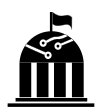
Back Gedesentraliseerde outonome organisasie AF داو (بلوكتشين) Arabic Organització autònoma descentralitzada Catalan Dezentralisierte Autonome Organisation German Αποκεντρωμένος αυτόνομος οργανισμός Greek Organización autónoma descentralizada Spanish Erakunde autonomo deszentralizatu (DAO) EU سازمان نامتمرکز خودگردان FA Organisation autonome décentralisée French ארגון אוטונומי מבוזר HE
| Part of a series on |
| Algocracy |
|---|
 |
| Examples |
A decentralized autonomous organization (DAO), sometimes called a decentralized autonomous corporation (DAC),[a][1] is an organization managed in whole or in part by decentralized computer programs, with voting and finances handled through a decentralized ledger technology like a blockchain.[2][3][4]. In particular, processes run by the decentralized programs must be central, enduring, and distinctive to the identity of the organization for the organization to be a DAO. In general terms, DAOs are member-owned communities without centralized leadership.[5][6] The precise legal status of this type of business organization is unclear.[7][8]
A well-known example, intended for venture capital funding, was The DAO, which amassed 3.6 million ether (ETH)—Ethereum's native cryptocurrency—then worth more than US$70 million in May 2016, and was hacked and drained of US$50 million in cryptocurrency weeks later.[9] The hack was reversed in the following weeks, and the money restored, via a hard fork of the Ethereum blockchain. Most Ethereum miners and clients switched to the new fork while the original chain became Ethereum Classic.
The governance of DAOs is subject to controversy. As these typically allocate and distribute tokens that grant voting rights, their accumulation may lead to concentration of power.[10]
Cite error: There are <ref group=lower-alpha> tags or {{efn}} templates on this page, but the references will not show without a {{reflist|group=lower-alpha}} template or {{notelist}} template (see the help page).
- ^ Hassan, Samer; De Filippi, Primavera (2021-04-20). "Decentralized Autonomous Organization". Internet Policy Review. 10 (2). doi:10.14763/2021.2.1556. ISSN 2197-6775. S2CID 235559086.
- ^ Cite error: The named reference
Vigna20150127was invoked but never defined (see the help page). - ^ Cite error: The named reference
Hodson20131120was invoked but never defined (see the help page). - ^ Cite error: The named reference
Economist20160521was invoked but never defined (see the help page). - ^ Prusty, Narayan (2017-04-27). Building Blockchain Projects. Birmingham, UK: Packt. p. 9. ISBN 978-1-78712533-9.
- ^ The Decentralized Autonomous Organization and Governance Issues Regulation of Financial Institutions Journal: Social Science Research Network (SSRN). 5 December 2017.
- ^ Cite error: The named reference
Popper20160521was invoked but never defined (see the help page). - ^ Barbereau, Tom; Bodó, Balázs (2023-07-01). "Beyond financial regulation of crypto-asset wallet software: In search of secondary liability". Computer Law & Security Review. 49: 105829. doi:10.1016/j.clsr.2023.105829. ISSN 0267-3649. S2CID 258733922.
- ^ Price, Rob (2016-06-17). "Digital currency Ethereum is cratering amid claims of a $50 million hack". Business Insider. Retrieved 2016-06-17.
- ^ Barbereau, Tom; Smethurst, Reilly; Papageorgiou, Orestis; Sedlmeir, Johannes; Fridgen, Gilbert (May 2023). "Decentralised Finance's timocratic governance: The distribution and exercise of tokenised voting rights". Technology in Society. 73: 102251. doi:10.1016/j.techsoc.2023.102251. S2CID 258245920.